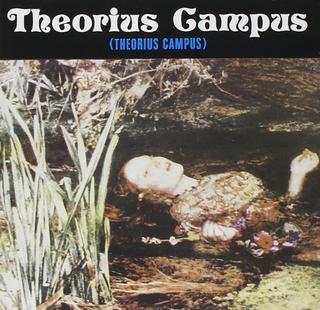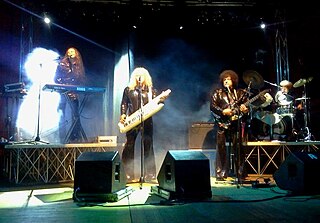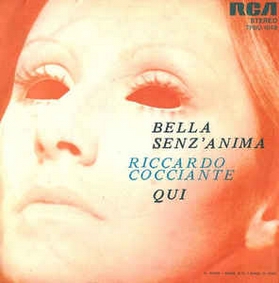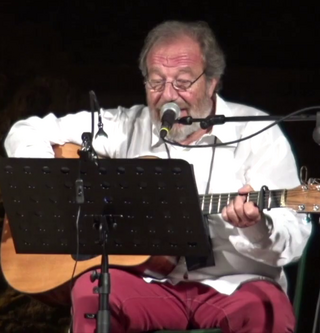
Francesco Guccini is an Italian singer, songwriter, actor, and writer. During the five decades of his music career he has recorded 16 studio albums and collections, and 6 live albums. He is also a writer, having published autobiographic and noir novels, and a comics writer. Guccini also worked as actor, soundtrack composer, lexicographer and dialectologist.

Domenica Rita Adriana Bertè, known professionally as Mia Martini, was an Italian singer, songwriter and musician. She is considered, by many experts, one of the most important and expressive female voices of Italian music, characterised by her interpretative intensity and her soulful performance.

Francesco De Gregori OMRI is an Italian singer-songwriter. In Italy, he is popularly known as "Il Principe dei cantautori", a nickname referring to the elegance of his lyrics. Although often referred as singer-songwriter and poet, he prefers to be identified simply as "artist".

Riccardo Cocciante, also known in French-speaking countries and the United States as Richard Cocciante, is an Italian and French singer and songwriter.

Antonio "Antonello" Venditti is an Italian singer-songwriter and pianist who became popular in the 1970s for the social themes addressed in his songs.

Franco Califano was an Italian lyricist, composer, singer-songwriter, author and actor. His songs sold about 20 million records during his career.

Salvatore Antonio "Rino" Gaetano was an Italian musician and singer-songwriter. He is famous for his satirical songs and oblique yet incisive political commentary. He is remembered for his raspy voice, for the heavily ironic lyrics of his songs and his social protests. He died in a car accident at age 30. He was a popular and influential figure, widely re-evaluated by the following teen generations.

Theorius Campus is the debut album by Italian singer-songwriters Antonello Venditti and Francesco De Gregori. Released by It in 1972, it marks the first and only collaborative project for both artists, who later decided to embark on solo careers. Although De Gregori and Venditti played on the whole album, they only share vocal duties on two songs, "Dolce signora che bruci" and "In mezzo alla città", alternating as lead vocalist in all the others.

Le cose della vita is an album by Italian singer-songwriter Antonello Venditti, released by RCA Italian in late 1973. The record is a true "solo" venture, as Venditti wrote, arranged, produced and played every note himself.

Claudio Lolli was an Italian singer-songwriter, poet, writer and secondary school teacher.

Francesco Pippo, known professionally as Pippo Franco, is an Italian actor, comedian, television presenter, and singer. He made his name first as a musician in the early 1960s, and in the late 1960s, began a career in film, starring in a great number of commedia sexy all'italiana, the "sexy comedy" subgenre of Italian comedy. In the 1970s he expanded into television, acting in TV movies and presenting variety shows. His type of comedy borrows heavily from cabaret. Throughout his career he continued to sing, appearing many times at the Sanremo Festival. He has made children's music as well, and has co-written three books on (linguistic) humor.

I Cugini di Campagna is an Italian pop band formed in 1970 in Rome. They are well known for the use of falsetto and for their eccentric look, a cross between glam and kitsch.

Niccolò Fabi is an Italian singer-songwriter. He rose to national fame after competing in the Newcomers' section of the Sanremo Music Festival 1997, receiving the Mia Martini Critics' Award for his entry "Capelli".

Antonello Fassari is an Italian actor and comedian.
Piero Ciampi was an Italian singer-songwriter.

"Bella senz'anima" is an Italian ballad song written by Marco Luberti, Paolo Casella and Riccardo Cocciante, arranged by Franco Pisano and performed by Riccardo Cocciante. It was the first single from the Cocciante's 1974 album Anima.

"Piccolo uomo" is a 1972 Italian song composed by Dario Baldan Bembo (music), Bruno Lauzi, and Michelangelo La Bionda (lyrics) and performed by Mia Martini. It was the singer's first significant commercial success.

Edoardo De Angelis is an Italian singer-songwriter and record producer.
"Roma nun fa' la stupida stasera" is a 1962 Italian song composed by Armando Trovajoli (music) and Garinei & Giovannini (lyrics).
"Lilly" is a 1975 Italian song composed and performed by Antonello Venditti, lead single of the eponymous album.

















